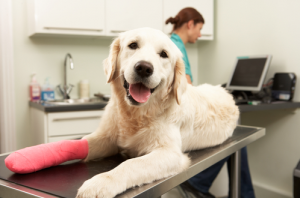Dear Fellow Pet Lovers,
Allergies. It seems that nowadays, everybody is allergic to something, whether it is a vaccine, certain foods, bee stings, drugs, etc… etc…
What IS allergy? Allergy is a situation in which the body’s protective immune system OVER-reacts to particles it does not recognize it self, when that over-reaction is not appropriate or even helpful. The body’s over-response is usually far more dangerous that the “foreign” particle that it is trying to eliminate.
Allergies can vary in severity from runny nose and red eyes to anaphylaxis, clogged airways, and even death.
One interesting thing about allergy is that you cannot be allergic to something that your body has never been exposed to. For example, to be allergic to a wasp sting, you would need to have been exposed to wasp stings prior.
The classical allergic reaction we see at Pet Emergency Clinic is a swollen face and often some whelts on the body. This may be seen after vaccination on certain pets, after bee sting, or possibly after an unknown exposure to something. Usually, antihistamine and maybe a short-acting steroid injection handle this beautifully.
We occasionally see a totally collapsed pet maybe with bloody diarrhea with no known trigger. It is interesting that, in these cases, the history may involve a walk outside an hour or so before the collapse. What is even more interesting is that there is a sign that we see on ultrasound that can diagnose this problem with pretty high certainty. (And even more “interesting” is the fact that our own Dr. Scroggs is a part of the current research on this with a famous veterinary researcher and teacher.)
I am one who is cursed with allergies. These do vary from a runny nose to an attack that makes me miserable, though it has never been life-threatening.
So, what can you do about allergies in pets?
1- Keep your yard tidy and neat in order to make it less appealing to wasps and other stinging bugs.
2- Be aware of what if anything that your pet is allergic to and avoid. (Avoidance of allergens is the only certain way to never have a reaction)
3- If your pet is known to be allergic to vaccines, consider the importance of the particular vaccine compared to the risk of the disease the vaccine protects against. A discussion with your veterinarian is in order.
4- Try to ignore hype about food allergy that you receive from pet stores or on TV. Most of the data bandied about in those places is false. Again, your DVM can assist if food allergies are thought to be a problem.
5- A product that I hear promoted heavily on the radio is called Dinovite. In the promo, it seems as if using this stuff handles any and all skin problems in a dog, a cat, or maybe even in a person. From the ads, it sounds like the product is some essential fatty acids and a few other things that are sometimes helpful. Still, I doubt that this is as universally successful as they suggest.
6- If you think that your pet may be having an allergic reaction to anything, get the pet seen by a doctor ASAP, since it is always possible that your pet could have one of those really bad ones. (But most are probably not)
So there you have it. My opinion and a few facts bout allergies in pets. (And I apologize to Dr. Barta, my immunology professor, for the simplicity.)
See? Something CAN be done about preventing pet illness.
That is all.
Dr. John Emerson, Pet Emergency Clinic








